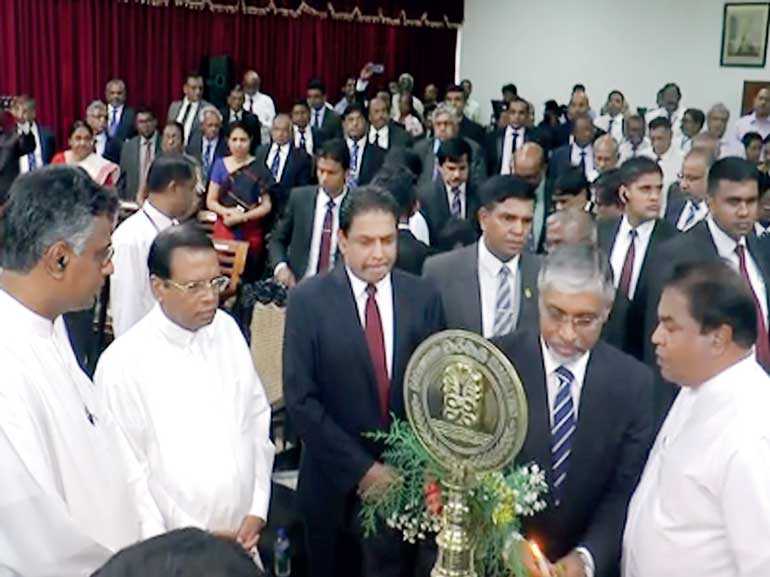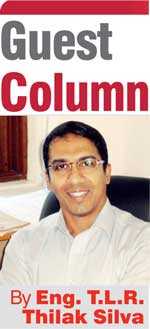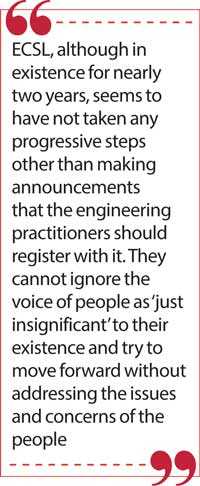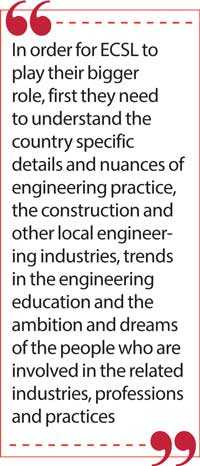Wednesday Feb 18, 2026
Wednesday Feb 18, 2026
Friday, 7 August 2020 00:00 - - {{hitsCtrl.values.hits}}

The ECSL Act has been passed by the previous government without consulting all those who might be affected by the proposed Act to air their grievances and without getting adequate feedback from the stakeholders of the engineering profession
Engineering Council, Sri Lanka Act, No. 4 of 2017
Engineering Council of Sri Lanka was set up in 2017 under Act No. 14 of 2017. This newly formed Engineering Council which is now the regulatory authority of engineering practice, has a vital role to  play in the country’s development process. Although this Act had been enacted in parliament in a rush by the previous government without giving it the total effect to yield the maximum benefits gained by other countries in the region by passing of similar Acts, there is room for improvements and amendments to make it an instrument of a future progressive government to develop the engineering practice to a higher level.
play in the country’s development process. Although this Act had been enacted in parliament in a rush by the previous government without giving it the total effect to yield the maximum benefits gained by other countries in the region by passing of similar Acts, there is room for improvements and amendments to make it an instrument of a future progressive government to develop the engineering practice to a higher level.
In coinciding with the World Youth Skills Day, of UN International Days of Observance, which fell on 15 July, President Gotabaya Rajapaksa has declared 2021-2030 the ‘Decade of Skills Development in Sri Lanka’. The President’s vision behind this declaration is to develop a generation of ‘Future Fits’, who will become ‘Principled Sri Lankans’ capable of becoming world leaders in any sector of choice and will drive the development of the nation and inspire a sense of pride for all Sri Lankans.
Newly formed Engineering Council, Sri Lanka (ECSL) can align its objectives and functions in line with the President’s vision and support the skills development in the field of engineering during the next decade.
Pakistan Engineering Council Act, 1975
Pakistan was the first country in South Asia who had set up an Engineering Council in 1975. Pakistan Engineering Council (PEC) Act, 1975, clearly states the vision behind setting up this act. They say: “The Council shall regulate the engineering profession with the vision that the engineering profession shall function as a key driving force for achieving rapid and sustainable growth in all national, economic and social fields”. This Act says that the Council as its mission, shall set and maintain ‘realistic’ and internationally relevant standards of professional competence and ethics for engineers, and license engineers and engineering institutions to competently and professionally promote and uphold the standards. The above vision and mission statements show the broad thinking of the Engineers of Pakistan who drafted this act. The above word ‘realistic’ itself talks about the practical thinking and their level of maturity.
However, on the contrary, our ECSL Act. No. 4, 2017 had avoided giving it a broader purpose. It says: “ECSL shall be responsible for the maintenance of professional standards and conduct of engineering practitioners; registration of different categories of engineering practitioners; and to provide for matters connected therewith or incidental thereto”. This Act has no clear vision and mission. The above definition of the Act itself, expresses that this Act has been passed by certain group of people with certain vested interests and not done for the overall benefit of the Democratic Socialist Republic of Sri Lanka and its people. One prominent engineer has mentioned during a recent event that ECSL’s only role is to register engineering practitioners. The Act has empowered ECSL with other functions and responsibilities than registration of engineering practitioners. If the Government and the Council want, they can make ECSL the ‘Mahagedara’ of engineering practice in Sri Lanka.
Our ECSL Act in its present form has following defined functions and powers which the Writer feels are positive for the development and progress of engineering practice to a certain extent:
1.Make representations to the Government and relevant bodies on matters relating to the practice of engineering profession in Sri Lanka.
2.Determine terms and conditions of registration of engineering practitioners.
3.Prepare a Code of Professional Conduct for the engineering practitioners.
In contrast, Pakistan Engineering Council Act, 1975 has broader functions in line with their vision and mission. Some of those functions worthwhile to mention are:
1.Promotion of reforms in the engineering profession.
2. Promotion of engineering education and review of courses of studies in consultation with the universities.
3.Assistance to the Federal Government as a think tank.
4.Promotion of engineering profession in totality.
5.Encouragement, facilitation and regulation of working of professional engineering bodies for creativity and as custodian of engineering under the umbrella of the Council.
6.Facilitating engineering sector industries.
7.Coordinating between various engineering forums and Federal Government.
Does this mean that Pakistani Engineers had a broader vision and purpose in 1975 which our Sri Lankan Engineers did not have in 2017 or our Engineers had a different purpose which is not transparent in written form in the ECSL Act?
ECSL has a bigger role to play
A progressive government in the future can make necessary amendments to our recently passed ECSL Act and give it a proper purpose of existence, a vision and a mission. We can also widen its functions further to make it the driving force for achieving rapid and sustainable growth in all national, economic and social fields.
Since ECSL Chairman’s announcement in August 2018 that ECSL has been in force since August 2018, they seem to have not made any progress so far under their functions and powers vested to them by this Act. They have started registering the engineering practitioners, while the Institution of Engineers (IESL) paid the first annual subscription for the year 2019 for their members out of their own funds and likewise the Institution of Incorporated Engineers (IIESL). For the last two years, they have not progressed in any other front, and as it seems, they are still complacent to believe that their only task is registering the engineering practitioners.
In order for ECSL to play their bigger role, first they need to understand the country specific details and nuances of engineering practice, the construction and other local engineering industries, trends in the engineering education and the ambition and dreams of the people who are involved in the related industries, professions and practices.
How do the engineering industries operate?
Engineering practitioners are the front-liners of the construction companies. They are like the infantry battalions in the army. They fight in the front line. ECSL should understand their roles in the construction companies.
Any large construction project is like a war front. The engineering practitioners in the construction projects work under many constraints. To name few such constraints; unrealistic project timelines, disturbing weather conditions, safety and quality challenges are some of them. The lives of engineering practitioners in the construction industry are physically demanding and psychologically stressful. Under such circumstances, except for few, many graduate engineers of IESL recognised degree programs do not like to work in the frontline jobs of the construction projects.
Although these graduate engineers prefer to work in support roles such as Planning Engineer, QA/QC Engineer, etc. in the project sites, majority of them decline to work in Project/Site Engineer roles which involve wider responsibilities and extended work hours. Under such situations, many major contractors utilise the engineering diploma holders and engineering graduates of IESL non recognised universities, as valuable resources to develop their front line engineering force.
ECSL needs to understand the dynamics of the engineering industries in a broader sense before imposing restrictions on those who presently practice engineering in a wider spectrum of engineering industries.
The same scenario applies in the manufacturing sector as well. There are many talented people who have rose to the position of the engineer in such organisations through their on job training, high level of commitment, born creativity and following in house and external training courses. ECSL should study the industry first before they determine the terms and conditions of engineering practitioners, which they are supposed to do as per the powers vested to them by the ECSL Act.
Practice of engineering is different to practice of medicine
Certain members of IESL who are in the decision making committees try to draw direct similarity of the engineering profession with the medical profession. In the writer’s opinion the practices of these two professions have significant differences and can no way be compared.
The medical education is directly related to the practice of the medical practitioner except for few who are in the administrative jobs and in public health. That is the very reason that most of the professors of medicine have their own wards in the government teaching hospitals. Engineering practice has wide diversity and way far different to the medical practice. It is mainly the university academics, design engineers and consultants who use some part of their university education in practice. There are many engineering practitioners in construction, manufacturing and maintenance who have mostly learnt practice of engineering through their on the job training, irrespective of the degrees and diplomas they hold. There are some talented people who have been promoted to the position of engineer, have not gone to universities or technical colleges. This fundamental phenomenon needs to be understood by the ECSL in its early days of active operation and hence should bring necessary regulations or amendments to the present Act to accommodate such people who are already practicing engineering with required competence in their respective fields but cannot be accommodated in the present four engineer categories identified in the ECSL Act.
There should be a grace period to allow the stakeholders to meet the requirements of the ECSL Act
The ECSL Act has been passed by the previous government without consulting all those who might be affected by the proposed Act to air their grievances and without getting adequate feedback from the stakeholders of the engineering profession. Many IESL members did not know what this act was all about. With the announcement by the ECSL in August 2018 that ECSL Act was in force, this has created a situation that many present engineering practitioners who do not comply with the restrictions imposed by the ECSL Act may lose their jobs.
The graduates of several engineering degree programs which were set up under the University Grants Commission Act No. 16 of 1978 will not be able to practice engineering after they complete their four-year degree programs. It is very strange to believe how the previous government who passed this Act failed to protect the rights of such citizens of this Democratic Republic of Sri Lanka who have become victims of this Act. It is very strange to believe how the prominent engineers of IESL who should act as the guardians of engineering profession had failed to defend the rights of the wider society who would be affected by this legislature. 
ECSL has the powers to reconsider its role as the regulating authority of engineering practice in Sri Lanka, seek the views of those who are affected by this Act and prepare a road map to implement the Act in stages in consultation and under the guidance of the government. A future progressive government should closely supervise the activities of ECSL and make sure that they would rectify the defects of this Act to protect the rights of all those who are affected by this Act.
ECSL has a wider role to play in the development of engineering education in the country
Today the engineering education is in the custody of few people at the Institution of Engineers Sri Lanka (IESL) who believe that engineers should pass out only from the state universities through free education system. They are the people who lead the educational sectional committees of IESL and pose barriers for the graduates who have done their degrees overseas and who have completed fee levied engineering degree programs locally. Sri Lanka is the only country in South East Asia where higher education in certain professional fields is only limited to state sponsored free education. As discussed before, it is the Pakistan Engineering Council (PEC) who regulates the engineering education in their country. They lead the accreditation process of engineering education institutions and as per the mission statement of the Act, they strive to maintain ‘realistic’ standards what is achievable within the resources available in their country. It should be the same approach that this country should follow in order to develop engineering education. While Washington Accord Standards are set as a higher level standards for those who aspire to work abroad, the relevant ‘realistic’ standards should be set as national standards for those who will work and serve in our own country. As the Engineering Council (ECSL) is now established, the task and the responsibilities of developing the engineering education should be entrusted to them.
Final recommendations
ECSL, although in existence for nearly two years, seems to have not taken any progressive steps other than making announcements that the engineering practitioners should register with it. They cannot ignore the voice of people as ‘just insignificant’ to their existence and try to move forward without addressing the issues and concerns of the people.
A future progressive government should intervene and review this Act in line with the problems highlighted above and appoint independent expert committees with wider stakeholder participation. Government should introduce necessary control mechanisms to promote equity and fairness in the activities, deliberations and decisions of ECSL. Future amendments to this Act need to include:
1.Broaden its purpose, include statements of mission and vision similar to Pakistan Engineering Council (PEC) Act.
2.The new amendments should give a road map for its full implementation and during this time period, government should take necessary steps to widen the scope of engineering education so that a wider section of the society can comply with the requirements of this legislature.
3.Broaden ECSL’s scope to develop engineering education in the country and entrust them with necessary powers for the accreditation of engineering education institutions of all levels.
4.Make other positive amendments in line with Pakistan Engineering Council Act, 1975.
With the proposed future amendments in the ECSL Act, ECSL should play a leading role of developing skills of the engineering practitioners to support the declaration made by President Gotabaya Rajapaksa that 2021-2030 will be the “Decade of Skills Development in Sri Lanka”.